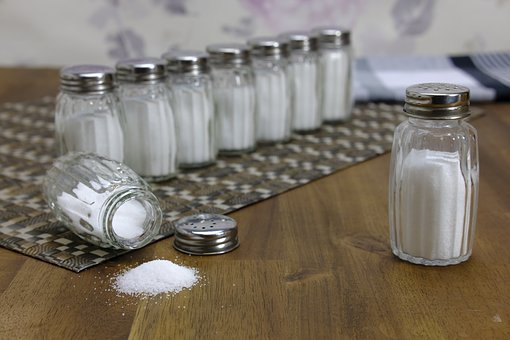Does Sodium Really Affect Blood Pressure?
Your body needs a small amount of sodium to maintain a healthy fluid balance and to properly transmit nerve impulses and contract and relax muscles, according to MayoClinic.com. However, too much sodium in your diet may cause high blood pressure, which is a risk factor for a variety of serious health problems.
THE PHYSIOLOGY
Your kidneys help you balance the sodium stored in your body by holding onto sodium when your levels are low and excreting it in urine when your levels are high. However, if you're sensitive to sodium, you may retain it rather than flushing it out, according to MayoClinic.com. Problems such as congestive heart failure, cirrhosis and chronic kidney disease contribute to unbalanced sodium levels. Because sodium holds onto water, your blood volume increases if your body can't flush out enough sodium. Your circulatory system must work harder to accommodate the extra blood volume and the pressure in your arteries increases. Chronic high sodium and high blood pressure increases your risk of heart disease, stroke and congestive heart failure.
RECOMMENDED LIMITS
Keep your sodium to less than 2,300 mg per day or limit it to 1,500 mg per day if you're African American, age 51 or older, or if you have high blood pressure, kidney disease or diabetes, recommends the 2010 Dietary Guidelines for Americans. As a reference point, 1 tsp. table salt contains 2,325 mg sodium. Because no specific sodium intake guidelines exist for infants and children, ask your pediatrician to give you dietary tips for your child. Also ask your doctor for specific advice if you're not sure how much sodium you can safely have.
MAJOR SOURCES OF SODIUM
The typical American consumes about 3,400 mg of sodium on a daily basis, which far exceeds the recommended intake, according to MayoClinic.com. You will have a better idea of how much sodium you consume each day if you are aware of some major sodium sources. Processed and prepared foods are a major culprit in the American diet. These include meat dishes, pizza, bacon, canned soups and fast foods. Condiments are also high in sodium, in many cases; you will take in about 1,000 mg sodium if you have 1 tbsp. regular soy sauce. You may also get a lot of sodium from home-cooked meals if you use the amount recommended on the recipe.

source
CUTTING BACK
You will naturally decrease your sodium intake if you focus on eating fresh foods. Fruits and vegetables are naturally low in sodium unless they are canned in salty water. Whole-grain rice is lower in sodium than rice products preprepared with added seasonings. If you do want to eat processed or prepared foods, look for low-sodium or no-salt-added varieties. Another way to cut back on sodium is simply to stop adding salt to food. You will reduce the discomfort of transitioning if you slowly decrease your intake. For example, cut back to 1/4 tsp. salt in recipes or on foods, then eventually toss the saltshaker out.
I've been healthy my entire life, and I love salt on my food :)